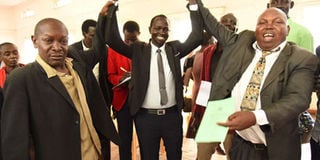Breaking News: Ruto postpones school reopening indefinitely due to flooding
Nakuru residents decry high rent as Sudanese move in

Kenyans and a Sudanese refugee (C) in a show of unity after a public participation meeting on the refugee bill, with the National Assembly Committee on Administration and National Security, at the Nakuru town hall on October 23, 2019. PHOTO | CHEBOITE KIGEN | NATION MEDIA GROUP
What you need to know:
- Local tenants said they have had to pay even double the prices in plots with people from South Sudan.
- A property agent who sought anonymity said Sudanese pay more because they hardly live alone, but in groups of five to 10 people.
- Residents told MPs that the government erred in allowing refugees freedom to "roam free" in urban areas as some have joined criminals gangs and become a threat to security.
Anxiety has gripped some residents of Nakuru over increase in house rent following an upsurge in the population of Sudanese refugees.
Those who spoke to the Nation said they have had to pay even double the prices in plots with people from South Sudan.
Ms Jesca Kamau, a tenant at Shaabab Estate in Nakuru West, said foreigners have flooded the estate so the rent has been hiked.
RENT DOUBLED
Ms Kamau said she paid Sh3,500 for a bedsitter in 2017 but that the rent was doubled last year so she had to move to Ponda Mali slum.
“Things have really changed. Rent used to be affordable to everybody although it would vary depending on class and living standards,” she said.
She added that landlords in Shaabab prefer to Sudanese tenants as they pay more and in full, and move in groups.
Mr Joseph Kimani from Whitehouse estate said that since the Sudanese move in groups, they occupy several houses in the same plot.
Of course their numbers attract most agents and landlords who make them pay higher rent," she said.
REASONS
Shabaab, White House, Free Area, Kaptembwa and London are popular estates as they are near the central business district and have good road networks, water supply and electricity connections.
A property agent who sought anonymity said Sudanese pay more because they hardly live alone, but in groups of five to 10 people.
The agent added, “When we rent house to Sudanese we are actually risking the safety of our properties. Most of them are rude and violent and do not easily pay for damages whenever you request them to.
"The only way out is to make them pay more so that in case of damages, the house owners can comfortably do repairs.
The agent further pointed out that it is difficult to set different charges based on the needs of each tenant or group of tenants.
“When we get Sudanese tenants we automatically increase the rent across all houses. It is difficult to charge different amounts for similar houses just because of some individuals’ origin,” he explained.
"A tenant is a tenant whether Sudanese, Somali, or Kenyan."
NO OPTIONS
London estate resident Christopher Rotich said he had no choice but to pay the higher rent.
“The rent shot to Sh10,000 for my one-bedroom house, from Sh6, 000 per month in 2016 and 2017, when the number of Sudanese increased," Mr Rotich said.
"But when I thought of moving my family, I was dismayed by the security concerns in other areas, most of which are slums.
“I can say, we are living a life that is not ours. The situation gets worse every day considering the state of the economy. The government needs to act with speed."
PUBLIC MEETING
Last week, during a public participation meeting by the National Assembly Committee on Administration and National Security, residents asked the government to restrict refugees or take them to camps in various towns.
They told the committee that the government erred in allowing refugees freedom to "roam free" in urban areas as some have joined criminals gangs and become a threat to security.
Mr Bol Ajak Atem, chairperson of South Sudanese Association in Nakuru said there are approximately of the area.
“Tenants from South Sudan usually pay rent every month just like other tenants. The only difference is that our members clear the bills on time so they continue enjoying the services,” Mr Atem said.
He acknowledged that their numbers had increased but did not go into details, saying the matter was sensitive.





